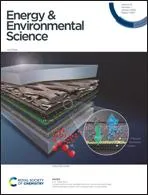Wide-temperature-range sodium-metal batteries: from fundamentals and obstacles to optimization
文献情報
Yu Sun, Jing-Chang Li, Haoshen Zhou
Sodium metal with a high theoretical specific capacity (∼1166 mA h g−1) and low redox potential (−2.71 V) shows tremendous application prospects in sodium-metal batteries (SMBs). However, studies of SMBs in extreme environments, especially at low temperature (LT) and high temperature (HT), have not received enough emphasis, and few reviews have summarize them. More seriously, some mechanistic issues, such as nucleation and deposition behavior, dendrite growth, interfacial chemistry and an unstable solid electrolyte interface (SEI), are perplexing. Herein, we start with the operation fundamentals of SMBs, simultaneously point out the obstacles faced by SMBs in different environments and propose various targeted optimization strategies, including construction of a three-dimensional (3D) framework, design of an artificial SEI and optimization of the liquid (solid-state) electrolyte/metal anode interface. Each strategy starts with carefully selected cases and then moves to illustrate the nucleation and deposition behavior of Na+ in the structure. Finally, we point out challenges, strategies and outlooks for the future practical applications of wide-temperature-range SMBs. Overall, this review provides a design guide for SMBs with high energy density, long lifespan, low-cost and high security, and could inspire more researchers to focus on the mechanism of batteries in extreme environments.
関連文献
IF 6.843
Efficient one-pot synthesis of alkyl levulinate from xylose with an integrated dehydration/transfer-hydrogenation/alcoholysis processIF 6.367
Photoactivatable fluorophores for durable labelling of individual cellsIF 6.222
MnO/C cubo-polyhedrons derived from α-MnO2@ZIF-8 as anode materials for high-performance lithium-ion batteriesIF 6.367
Co9S8 integrated into nitrogen/sulfur dual-doped carbon nanofibers as an efficient oxygen bifunctional electrocatalyst for Zn–air batteriesIF 6.367
Non-aqueous neptunium and plutonium redox behaviour in THF – access to a rare Np(iii) synthetic precursorIF 6.222
Enhanced activity of catalysts on substrates with surface protonic current in an electrical field – a reviewIF 6.222
Life cycle assessment of power-to-gas with biogas as the carbon sourceIF 6.367
Pulsed laser rusted stainless steel: a robust electrode material applied for energy storage and generation applicationsIF 6.367
Milk exosomes with enhanced mucus penetrability for oral delivery of siRNAIF 6.843
掲載誌
Energy & Environmental Science

Energy & Environmental Science is an international journal dedicated to publishing exceptionally important and high quality, agenda-setting research tackling the key global and societal challenges of ensuring the provision of energy and protecting our environment for the future. The scope is intentionally broad and the journal recognises the complexity of issues and challenges relating to energy conversion and storage, alternative fuel technologies and environmental science. For work to be published it must be linked to the energy-environment nexus and be of significant general interest to our community-spanning readership. All scales of studies and analysis, from impactful fundamental advances, to interdisciplinary research across the (bio)chemical, (bio/geo)physical sciences and chemical engineering disciplines are welcomed. Topics include, but are not limited to, the following: Solar energy conversion and photovoltaics Solar fuels and artificial photosynthesis Fuel cells Hydrogen storage and (bio) hydrogen production Materials for energy systems Capture, storage and fate of CO2, including chemicals and fuels from CO2 Catalysis for a variety of feedstocks (for example, oil, gas, coal, biomass and synthesis gas) Biofuels and biorefineries Materials in extreme environments Environmental impacts of energy technologies Global atmospheric chemistry and climate change as related to energy systems Water-energy nexus Energy systems and networks Globally applicable principles of energy policy and techno-economics
おすすめサプライヤー
 KUKA Systems GmbH
KUKA Systems GmbH 陕西缔都医薬化工有限公司
陕西缔都医薬化工有限公司 武汉荣申化工有限公司
武汉荣申化工有限公司 STRIKO Verfahrenstechnik W.Strikfeldt & Koch GmbH
STRIKO Verfahrenstechnik W.Strikfeldt & Koch GmbH 合肥新НОワバイオテクノロジー株式会社
合肥新НОワバイオテクノロジー株式会社 ポリシウス AG
ポリシウス AG 石家庄天越精細化学工業有限公司
石家庄天越精細化学工業有限公司 イ有意思的翻译有点问题,应该是无锡嘉屹化工有限公司\n无锡嘉屹化工有限公司
イ有意思的翻译有点问题,应该是无锡嘉屹化工有限公司\n无锡嘉屹化工有限公司 杭州海达医药化工有限公司
杭州海达医药化工有限公司 HSTマシンバウ GmbH
HSTマシンバウ GmbH












![59156-70-6 - 1,1'-[(1,6-Dioxo-1,6-hexanediyl)bis(oxy)]di(2,5-pyrrolidinedione) 59156-70-6 - 1,1'-[(1,6-Dioxo-1,6-hexanediyl)bis(oxy)]di(2,5-pyrrolidinedione)](/structs/591/59156-70-6-0f4b.webp)

